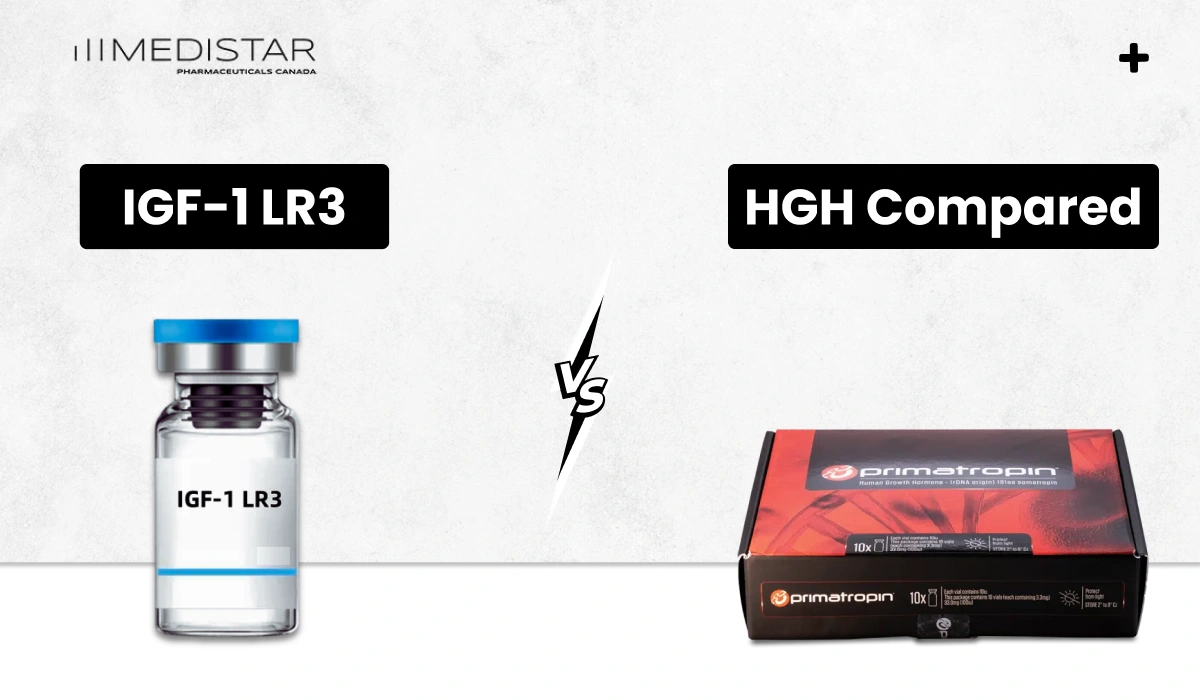When it comes to muscle growth, fat loss, and anti-aging, two compounds stand out among athletes, fitness enthusiasts, and biohackers: IGF-1 LR3 vs HGH. Both these compounds are powerful agents that influence growth, recovery, and overall body composition. However, these two compounds work in very different ways. The question is: Which one should you go for? What suits you best? Well you’re at the right place. Welcome to Medistar Canada. Whether you’re trying to understand how they compare, or looking for the best HGH supplements and alternatives, this guide will break down everything you need to know.
Key Takeaways
- IGF-1 LR3 Vs. HGH is not about which is universally better, but which aligns with your personal goals, longevity vs performance.
- HGH (Human Growth Hormone) provides broad systemic benefits such as fat loss, anti-aging, better recovery, and long-term tissue repair.
- IGF-1 LR3 acts directly on muscle cells, making it highly effective for rapid muscle growth, hypertrophy, and faster recovery.
What is IGF-1 LR3?
Insulin-like Growth Factor-1 Long R3 (IGF-1 LR3) is a modified version of IGF-1, a protein hormone naturally produced in the liver as a result of HGH stimulation. IGF-1 LR3 is noted for direct muscle growth and repair, enhancing nutrient delivery to muscles, supporting lean muscle gain, and improving recovery between workouts. Unlike HGH, which indirectly triggers IGF-1 production, IGF-1 LR3 delivers that growth signal directly.
What is Human Growth Hormone?
Human growth hormone (HGH) is a naturally occurring peptide hormone produced in the pituitary gland. It stimulates growth, cell regeneration, and metabolism in the body. In bodybuilding and wellness, Benefits of HGH include: increase in lean muscle mass, reduced body fat, improved recovery and joint health, and enhanced sleep and energy levels. HGH is considered a “master hormone” for youth and vitality. Athletes and anti-aging enthusiasts often explore HGH for sale in search of these rejuvenating benefits.
IGF-1 LR3 VS. HGH : Key Differences
HGH and IRF-1 LR3 may seem similar at first glance but their action inside the body varies drastically. Here’s a breakdown of key differences between these two compounds.
| Feature/Effect | HGH | IGF-1 LR3 |
| Mechanism of Action | Stimulates liver to produce IGF-1; supports systemic growth and metabolism | Directly acts on muscle cells for growth and repair |
| Primary Benefits | Fat loss, anti-aging, improved recovery, energy, overall health | Rapid muscle growth, hypertrophy, faster recovery |
| Muscle Building | Steady, long-term lean mass gains | Fast, localized growth in muscle tissue |
| Fat Loss Effects | Strong – increases metabolism and fat breakdown | Minimal – focus is on muscle repair |
| Anti-Aging Properties | Excellent – improves skin, sleep, vitality | Limited – not commonly used for anti-aging |
| Best For | Longevity, fat loss, recovery, overall health | Athletes, bodybuilders, muscle hypertrophy |
| Side Effects | Water retention, joint pain, insulin resistance | Hypoglycemia, jaw/muscle pain, organ growth risk |
| Onset of effects | Gradual, takes weeks to months | Rapid, noticeable within days to weeks |
| Duration of Action | Long-lasting systemic benefits | Shorter, targeted action (extended by LR3 modification) |
| Cost & Availability | Expensive, widely recognized | Cheaper, less standardized quality |
IGF-1 Vs. HFG: Which is Better for You?
After the key differences, the real question is HGH Vs. IGF-1, which one is better for you? Well, here’s the answer:
For overall health, longevity, and fat loss: HGH is superior. It provides systemic benefits, making it ideal for long-term use and anti-aging.
For rapid muscle growth and recovery: IGF-1 LR3 shines. Its direct action on muscle tissue means quicker results in hypertrophy.
For advanced bodybuilders: Many combine HGH with IGF-1 LR3 to maximize growth and recovery, though this approach requires caution and medical guidance.
Conclusion
Before deciding what compound to go for, HGH Vs. IGF-1, you need to decide what you are trying to achieve. HGH delivers broad health, fat loss, and anti-aging benefits, while IGF-1 LR3 excels in rapid muscle-building and recovery. For many, the choice is not one or the other but how to balance them safely and effectively. Align these compounds with your personal goal and see the difference yourself!
Frequently Asked Questions
Which is better, HGH or IGF-1 LR3?
Which one is better for you depends on your personal goal. For fat loss, anti-aging, and systemic health benefits, HGH is better. For rapid muscle growth and recovery, IGF-1 LR3 is more effective.
Does IGF-1 LR3 Really Work?
Yes, IGF-1 LR3 is highly effective for muscle repair and hypertrophy, but it is more niche compared to HGH and carries higher risks if misused.
What is Better Than HGH?
Some argue IGF-1 LR3 is better for muscle growth, but for longevity and fat loss, HGH remains unmatched. The best choice often depends on whether you prioritize aesthetics or health.
What is the Most Effective Growth Hormone?
Human growth hormone is the most effective and well-studied option for overall growth, repair, and fat loss. However, combining HGH with IGF-1 LR3 can provide synergistic effects for athletes.
Disclaimer: This content is for informational purposes only and is not medical advice. Always consult a healthcare professional before using any steroids, SARMs, or supplements. Use products responsibly and in accordance with Canadian laws.





